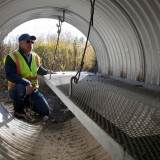The argument we hear most frequently from the Harper Government in favour of bulldozing through the proposed Enbridge Northern Gateway pipelines is the major job benefits the project would carry for Canadians. But recent talk of importing foreign workers from the United States and China make a mockery of that boast.
The latest evidence to this effect – a job posting on the American website run by Veterans of Foreign Wars, which helps vets find employment – bears some claims that are so absurd as to beg the question whether it’s a hoax. Some of the figures cited are highly suspect; nevertheless, on the whole, it provides telling window into an alternative narrative emerging around the Tar Sands pipelines issue. The posting reads:
The Veterans of Foreign Wars of the U.S. is proud to announce that its partly owned veterans jobs board has secured an exclusive employment initiative with Alberta, Canada, that could see thousands of U.S. veterans heading north to work on their oil pipeline.
“This is a great opportunity for veterans, transitioning military, National Guard and reservists, and their family members,” said Ted Daywalt, founder and CEO of VetJobs (www.vetjobs.com), a recognized industry leader in helping veterans find work.
“Though America’s Keystone Pipeline is delayed, the Canadians are moving forward on their side of the border and have an immediate need for tens of thousands of workers,” said Daywalt, whose website averages more than 55,000 daily job postings by employers strictly interested in hiring veterans. He said the Edmonton Economic Development Corporation anticipates a shortage of 114,000 workers in the Alberta area, and they want to hire American veterans to fill that shortage.
According to the development corporation, the positions being offered are long term, with many paying as much as 30 percent more than similar industry positions in the United States. Some positions will require a move to Canada, but many others will allow veterans to commute — working several weeks in Canada, then one week back home. (emphasis added)
The posting came my way via a BC-based environmental discussion listserv, Land Watch, and has provoked some interesting questions.
For starters – beyond the matter-of-fact assertion that “the Canadians are moving forward on their side of the border” with our highly controversial proposed pipeline projects – there’s the eyebrow-raising jobs claim. Creating 114,000 jobs would essentially mean doubling the current employment of the entire Canadian oil and gas sector, and yet the ad only mentions pipeline construction jobs specifically.
Even Enbridge (whose new ad campaign touting myriad economic benefits sputtered recently over a spoof by Province cartoonist Dan Murphy that went viral) and the project’s looniest boosters acknowledge the pipeline would provide a few thousand temporary jobs at best. Once it’s built, BC would see only several dozen permanent jobs. A recent study by the Petroleum Human Resources Council of Canada suggests the workforce of the Alberta Tar Sands – which altogether employs just 20,000 people, constituting 15% of Canada’s total oil and gas jobs – will rise by 73% by 2021, but that pales in comparison with the numbers being thrown around by Veterans of Foreign Wars.
The posting rings true on another front, though – the fact that both BC and Alberta are approaching full employment territory, putting paid to the argument we need new jobs at the expense of our environment. BC and Alberta are both seeing strong job growth today – with unemployment in BC falling by .8% from May to 6.6% in June (though some of BC’s lower unemployment numbers derive from workers heading across the border to Alberta). Alberta lost a handful of jobs in June, but its unemployment rate remains at a paltry 4.6%.
We’re told ad nauseum that we need to accept the certain risk of pipeline leaks and tanker spills because we badly need the jobs that come with these projects, yet the plain fact is we don’t have the workforce to provide tens of thousands of new employees for Tar Sands-related development.
One line in particular stands out in the job ad, namely that “…[the] veterans jobs board has secured an exclusive employment initiative with Alberta, Canada…” Secured? With whom? The Alberta Government? The Government of Canada? Has an American company signed a deal with our government(s) to provide foreign labour to Canada, and if so, why have we heard nothing of it from our elected officials? It could be this is just exaggerated salesmanship on the part of this jobs site, but these are questions that need answering.
Another question the posting raises is why would we pay these workers 30% more in Canada than south of the border? This claim seems to conflict with the other major challenge to the jobs argument – the recent revelation that state-owned energy giant PetroChina wants to build the Enbridge pipeline. The advantage to Enbridge from this proposition is a significant discount on labour, as the Harper Government recently changed our laws to allow companies operating in Canada to pay temporary foreign workers 15% less than the average wage for Canadians. This hardly seems like the policy of a government concerned about creating oil and gas jobs for its citizens.
And again, these direct job-related concerns are on top of the certain environmental and economic calamities of pipeline leaks and tanker spills – which would also be a huge blow to BC’s tourism and natural resource-dependent economy.
Perhaps a larger issue at hand is the matter of Canadian energy security and economic sovereignty.
The picture now emerging is of Chinese and American companies harvesting our bitumen, using Chinese and American labour to extract it, and building the pipelines to transport it back to their own countries to refine it (where the real jobs are), along with the profits from the whole operation. Moreover, we’re only a trade deal away from it being illegal to stop exporting oil to China once we’ve started. We’ve already sacrificed much of our resource and economic sovereignty under NAFTA and the privately controlled American corporation, NERC, which we’ve empowered to regulate our public energy system. Now we’re talking about recently retired American soldiers coming up here to build our oil infrastructure, which is more than a little unsettling.
Finally, in addition to the hollowing out of the “jobs” argument, the macro-economic impacts of expanded pipelines and Tar Sands development have been questioned by the likes of Official Opposition Leader Thomas Mulcair, economist and former ICBC CEO Robyn Allan, and the Organization for Economic Cooperation and Development.
Thus, when Stephen Harper and his minions declare the Enbridge pipelines would be good for “the economy”, we must ask the key question: “Whose economy?” US veterans, Chinese migrant workers, China itself and the mostly-foreign shareholders of multinational corporations? Check.
The public of BC and Canada? Not so much.







